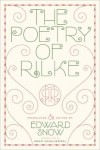Out recently: the paperback edition of Edward Snow’s translations of Rilke, with Adam Zagajewski’s capacious introduction. From which:
Maybe it’s more interesting to see Rilke’s work as not as virginal, not as ethereal, as it seems to many readers. After all, like the majority of literary modernists, he is an antimodern; one of the main impulses in his work consists of looking for antidotes to modernity. Heroes of his poems move in a spiritual space, not in the streets of New York or Paris, but they also, because of their intense existence, are meant to act against the supposed or real ugliness of the modern world. Even Rilke’s snobbery, hypothetical or not, can be seen as corresponding more to his ideas than to the weaknesses of his character: aristocrats represented for the poet the survivors of a better Europe, a chivalric continent, as opposed to the degredation caused by profit-oriented modernity, cherishing mass production and car races. He was not alone in representing this position—it will be enough to refer to the aesthetic movement and Walter Pater, who preceded him by one generation. Had Rilke met Marcel Proust, who was born only four years before our poet (they never met, but we know that Rilke admired the first volumes of À la recherche du temps perdu, published before his death), we can be sure there would have been between them no major disagreement concerning matters of philosophy, taste, and society. And certainly he would have readily agreed with his friend Paul Valéry when the French poet was was sadly sighing at the sight of a new Europe of efficiency, labor, and military drill, and when, regretting the loss of the unhurried pace of intellectual work and musing in the past he pronounced these beautiful words: “Adieu, travaux infiniment lents . . .”
Some of the more sharp-eyed scholars have even found one or two sentences in Rilke’s letters in praise of Mussolini. This is not what I mean: I don’t intend to accuse the superb poet of any political misdemeanor. What I want is simply also to see in his poetry a dimension that has a lot to do with the diversity of intellectual polemics, some of which are still ongoing. We’re still pondering the value of modernity, as was Rilke, even if we do this using different notions and examples. We have a new sorrow today: after the terrible catastrophes of the twentieth century, after the disasters that entered both our memory and imagination, we tread gingerly at the point where poetry meets society; “Don’t walk beyond this line,” as the sign on every jetliner’s wing warns us. And yet the central issue for us is probably the question of whether the mystery at the heart of poetry (and of art in general) can be kept safe against the assaults of an omnipresent talkative and soulless journalism and an equally omnipresent popular science—or pseudo-science. It also has a lot to do with the weighing of the advantages and vices of mass culture, with the influence of mass media, and with a difficult search for genuine expression inside the commercial framework that has replaced older, less vulgar traditions and institutions in our societies. In this respect, it’s true, poets have less to fear than their friends the painters, especially the successful ones, who, because of the absurd prices their works can now command, will never see their canvases in the houses of their fellow artists, in the apartments of people like themselves, only in vaults belonging to oil or television moguls who don’t even have time to look at them. Still, the stakes of the debate and its seriousness are not very different and not less important than a hundred years ago.
We know that the main domain of poetry is contemplation, through the riches of language, of human and nonhuman realities, in their separateness and in their numerous encounters, tragic or joyful. Rilke’s powerful Angel standing at the gates of the Elegies, timeless as he is, is there to guard something that the modern era—which gave us so much in other fields—took away from us or only concealed: ecstatic moments, for instance, moments of wonder, hours of mystical ignorance, days of leisure, sweet slowness of reading and meditating. Ecstatic moments—aren’t they one of the main reasons why poetry readers cannot live without Rilke’s work? I mean here readers of contemporary poetry who otherwise are mostly kept on a rather meager diet of irony. The Angel is timeless, and yet his timelessness is directed against the deficiencies of a certain epoch. So is Rilke: timeless and deeply immersed in his own historic time. Not innocent, though: only silence is innocent, and he still speaks to us.
 From The Poetry of Rilke, translated by Edward Snow, with an introduction by Adam Zagajewski
From The Poetry of Rilke, translated by Edward Snow, with an introduction by Adam Zagajewski
Read more by Adam Zagajewski in Little Star #2 and in Unseen Hand, translated by Clare Cavanagh, just out from FSG.
By the way, read Karl Kirchwey’s translations of Paul Verlaine here and here, in Little Star #2, and in Poems Under Saturn, just out from Princeton’s Lockert Library of Poetry in Translation.
[…] one of the main impulses in his work consists of looking for antidotes to modernity.” Adam Zagajewski’s introductie tot een vertaling van Rilke. Deel ditE-mailTwitterFacebookGoogle +1MeerLinkedInPrintDiggRedditStumbleUpon input, textarea{} […]
[…] The Poetry of Rilke, with a beautiful introduction by Adam Zagajewski, from which we excerpted here on Little Star. Snow’s version first appeared in a two-volume hardcover edition of the New Poems from North […]